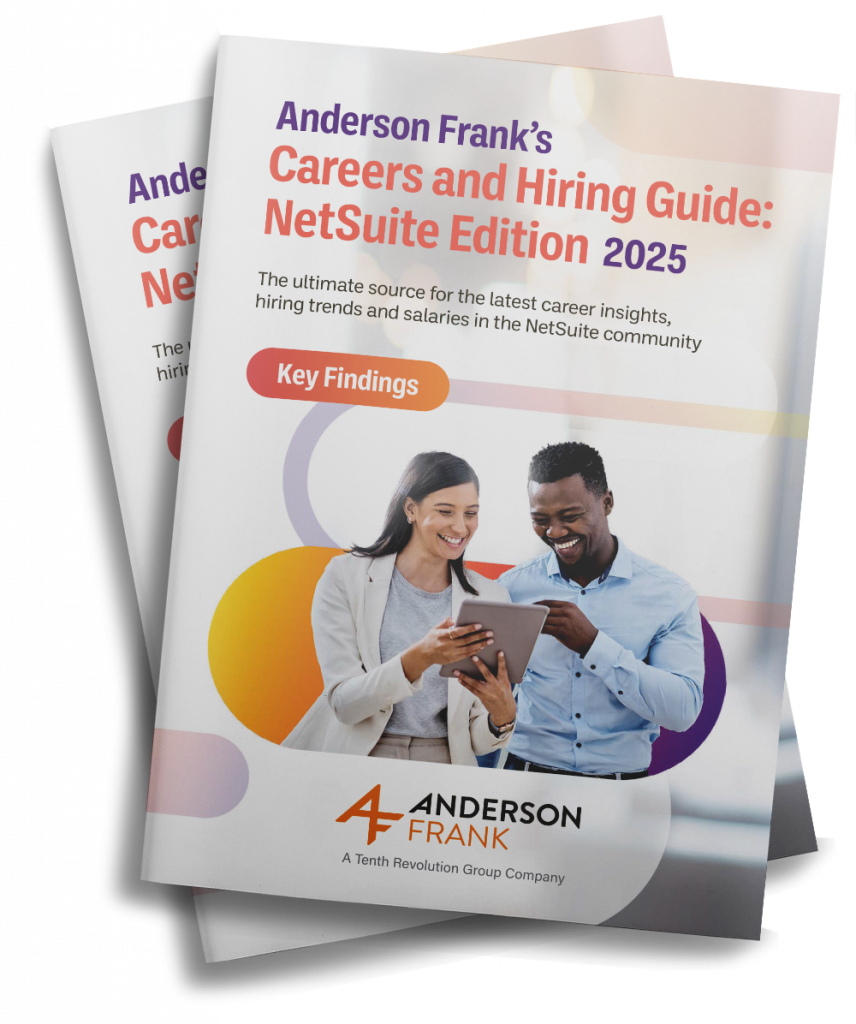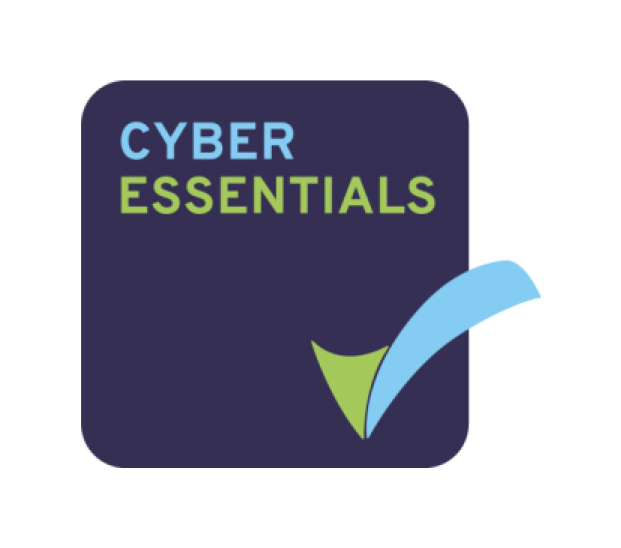Insights for Permanent NetSuite professionals
Whatever the NetSuite role, use our guide to benchmark your salary, or to uncover what you should be paying employees in your team.

What do hiring managers look for in a NetSuite candidate during a job interview?
| Positive attitude | 50% |
| Willingness to learn | 49% |
| Cultural fit | 47% |
| The ability to demonstrate their skills | 39% |
| Resourcefulness | 37% |
| Integrity | 33% |
| Communication | 31% |
| An understanding of the role | 31% |
| Creativity | 24% |
| Openness to new approaches | 24% |
| Passion | 23% |
| Preparation for the interview | 19% |
| Confidence | 19% |
| An understanding of the company | 15% |
| Other | 2% |
The hiring managers that took part in our survey told us that there are on average four steps to the hiring process in their organization. This includes an initial application, a number of interviews, and in some cases a competency test. Similarly, recent candidates completed an average of three interview stages for their current role.
Factors that impact on your earning potential according to our respondents
| Important – 86% |
| Neutral – 12% |
| Unimportant – 3% |
| Important – 84% |
| Neutral – 11% |
| Unimportant – 6% |
| Important – 78% |
| Neutral – 18% |
| Unimportant – 4% |
| Important – 69% |
| Neutral – 23% |
| Unimportant – 7% |
| Important – 66% |
| Neutral – 20% |
| Unimportant – 14% |
| Important – 59% |
| Neutral – 31% |
| Unimportant – 11% |
| Important | Neutral | Unimportant | |
|---|---|---|---|
| Years of technical experience with NetSuite | |||
| Years of experience in IT/Ops/Finance | |||
| Exposure to large projects | |||
| Specific vertical/industry experience | |||
| College/University degree(s) | |||
| NetSuite certifications |
Although years of experience with NetSuite is the most important factor for both permanent employees (85%) and freelancers (89%), the second priority differs between the two groups. Permanent employees place greater importance on years of industry experience, while freelancers prioritize exposure to large projects (85% and 86% respectively).
Interestingly, while years of NetSuite experience is the most crucial factor for earning potential among those working for a NetSuite partner (85%), end user employees consider years of industry experience (92%) most important, followed by technical NetSuite experience (87%).
- Good interpersonal skills
- Building a diverse professional network and leveraging connections
- Developing leadership skills
- PMP certification or project management experience
Want to better understand what you could be earning and compare your salary against your peers?
Download our salary tables brochure for more insight into NetSuite salaries in your country.

What is on offer in the jobs market?
Are NetSuite professionals experiencing pay increases?
Over two-thirds (68%, down from 75% in our previous survey) of NetSuite professionals received a salary increase from their current employer in the last year.
On average, those who gained a salary increase with their current employer in the last year saw their pay rise by 11%.
Let’s see those pay increases broken down further:
The number of employees that received a pay rise of over 30%, decreased from 13% in our last survey, to 6% this time.
What reasons did NetSuite professionals give for experiencing a pay increase?
| I received a performance-related increase | 52% |
| I received an incremental pay increase | 48% |
| I received a promotion | 30% |
| I gained an additional NetSuite certification | 7% |
| There's a lack of NetSuite talent in the market and my employer wants to keep me | 5% |
| Greater demand for NetSuite professionals has increased my market value and my employer wants to keep me | 4% |
| My organization made staffing cuts and I have taken on more work | 4% |
| My organization is more profitable now than it was 12 months ago | 4% |
| More opportunities for remote work have increased my job options and my employer wants to keep me | 2% |
| I received an incremental pay increase | 52% |
| I received a performance-related increase | 43% |
| I received a promotion | 38% |
| Greater demand for NetSuite professionals has increased my market value and my employer wants to keep me | 19% |
| There's a lack of NetSuite talent in the market and my employer wants to keep me | 19% |
| I gained an additional NetSuite certification | 14% |
| Increased demand for NetSuite services means my organization has more clients than a year ago | 10% |
| My organization made staffing cuts and I have taken on more work | 5% |
| My organization offered staff pay increases due to an increased workload | 5% |
Did your salary change when you last changed jobs?
On average, those that experienced a salary increase when changing jobs saw their pay rise by 22%, up slightly on last year’s increase of 20%.

- Less responsibility
- For a better work-life balance
- I wanted to take my career in a new direction
- It involved less travel
- It involved a shorter commute
- A better overall benefits package
Counteroffers
Over half (51%, up from 47% in our last survey) of professionals have received a counteroffer after resigning from a role. A counteroffer is an offer provided by your employer intended to make you reconsider your resignation. A third (33%) of those that have received a counteroffer accepted it.
What are employees offered as a counteroffer?
| Salary increase | 84% |
| Promotion | 25% |
| Bonus | 16% |
| Retention bonus | 14% |
| Training and development opportunities | 14% |
| Remote working | 13% |
| Flexible working hours | 13% |
| Additional paid time off | 9% |
| Shares in the company | 8% |
| Employer paid for certifications | 6% |
| Other | 3% |
| Salary increase | 84% |
| Promotion | 25% |
| Bonus | 16% |
| Retention bonus | 14% |
| Training and development opportunities | 14% |
| Remote working | 13% |
| Flexible working hours | 14% |
| Additional paid time off | 9% |
| Shares in the company | 8% |
| Employer paid for certifications | 6% |
| Other | 3% |
Among those who received a salary increase as part of their counteroffer, the average pay rise was 16%.
Rewards and recognition
While arguments over remote work continue to rumble on, the importance of a well-rounded benefits package that reflects the modern workforce cannot be underestimated. For instance, as recently as four years ago a company supplied laptop was seen as a desirable perk. Fast forward a couple of years and few of us would be able to work without one. Similarly, are on site gyms or free parking as attractive to employees who may only visit the office once or twice a week?
With benefits themselves remaining an important part of the decision-making process for jobseekers, the answers of this section are essential reading for employers looking to bolster their hiring strategy.
What employee benefits are NetSuite professionals receiving?
| 1. Home working | 86% |
| 2. Health/medical insurance | 71% |
| 3. Company laptop | 68% |
| 4. Retirement savings plan/401(k) match/pension contributions | 65% |
| 5. Bonus (monthly/biannual/year-end bonus) | 64% |
| 6. Dental plan | 57% |
| 7. Vision/optical plan | 50% |
| 8. Casual dress policy | 45% |
| 9. Life insurance | 45% |
| 10. Flexible working hours | 44% |
| 1. Home working | 86% |
| 2. Health/medical insurance | 71% |
| 3. Company laptop | 68% |
| 4. Retirement savings plan/401(k) Match/pension contributions | 65% |
| 5. Bonus (monthly/biannual/year-end bonus) | 54% |
| 6. Dental plan | 57% |
| 7. Vision/optical plan | 50% |
| 8. Casual dress policy | 45% |
| 9. Life insurance | 45% |
| 10. Flexible working hours | 44% |

Average working hours
Permanent employees who took part in our survey work between 5 and 60 hours per week—with 3% of respondents telling they work more than 60 hours a week, while the average working week is 41 hours.
How many employers are offering remote working?
We asked respondents to tell us how many days they work remotely or from home per week, and the results are as follows:
14%
16%
14%
9%
8%
39%

Is remote working here to stay? Find out more.
Paid time off by region
Professionals working in a permanent role tell us that they receive, on average, 19 days of paid time off (PTO) a year.
This varies from country to country, dependent on a number of factors. Employment laws in a specific location is the most obvious, but there are often significant differences in PTO on offer within a single country too. Internal policies, industry standards, and job roles can all impact the amount of time a candidate is entitled to take off—with companies increasingly seeing a generous (and in some cases unlimited) entitlement as part of their attraction/retention strategy.
See below for average PTO days by country:
Conclusion
The benefits on offer from employers differ massively, including by location, although there are many common themes that remain the same. Understandably, health insurance has featured much more prominently in recent years—just one example of the importance of your benefits package being an ongoing and fluid package rather than set in stone until the end of time.
As much as employers may wish to see the return to offices for staff, with almost two-thirds still remaining fully remote, there has to be either understanding on an employer’s part or an incentive for the employee to return. So long as staff remain productive and engaged, then dialing back on a benefit that can bring many positives (such as better work-life balance, increased diversity within an organization) needs to be handled with care.
The evidence suggests this is likely to be the case—certainly the most popular benefits on offer right now seem to focus on employee wellbeing, which is a huge positive in an industry that can see people suffer from burnout.
Our key findings report contains highlights from this year’s Careers and Hiring Guide, plus our salary tables allow you to compare your salary or benchmark your teams’ salaries no matter their role in the NetSuite ecosystem.



